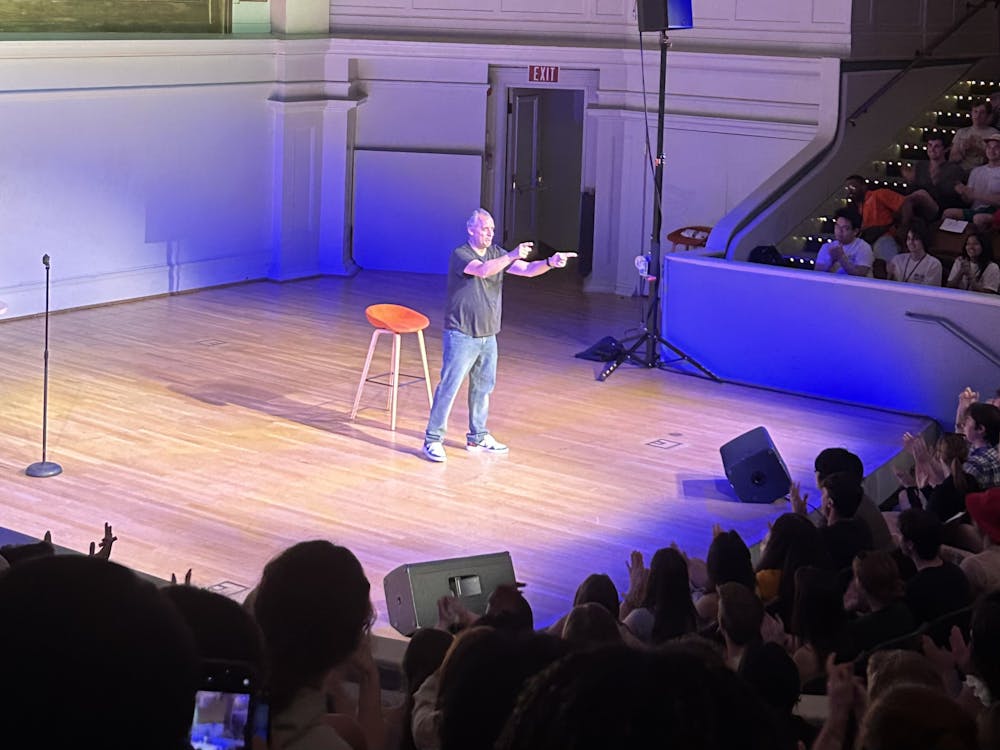This year may seem like the perfect incubator for female comedians. As the #MeToo movement follows close on the heels of Trump’s pussy-grabbing comments, men can hardly laugh off their complicity in late-night sketch shows. A woman’s ability to critique via jokes the culture which has long abused her has a strong potential for audience buy-in, particularly among under-targeted female audiences.
Comedian Michelle Wolf, however, exemplifies the continuing struggle of successful female-driven comedy under the male gaze. Her Netflix series “The Break with Michelle Wolf” debuted May 27 after her comments at the White House Correspondent Dinner propelled her to internet fame. When Wolf quipped that Press Secretary Sarah Huckabee Sanders turned the ashes of her lies into the perfect smoky eye, critics decried the remark as anti-feminist, as shade thrown on Sanders’ appearance rather than condemnation of her deceit.
The preoccupation with describing Wolf as Wolf described Sanders at the dinner — as an “Uncle Tom but for white women who disappoint other white women” — epitomizes the selective hearing of those looking to shift blame and the inevitability of sexist critique in response to female performance. These critics eclipsed attention from Wolf’s finer points — specifically how the dinner’s audience, mainstream media, has profited off the Trump administration — in order to harangue her.
In her debut episode of “The Break,” entitled “Strong Female Lead,” Wolf feels compelled to reiterate that her Correspondent Dinner jokes about Sanders focused on her “ugly personality.” Wolf makes a point to critique the appearance of chef Mario Batali, who is a swinish man under investigation as a sexual predator and thereby indefensible. She follows up these jokes by claiming “[Sanders] has the Mario Batali of personalities.” The deliberate decision to mock male rather than female appearance could simply be Wolf sticking to her guns, but the mockery feels quite pointed given how difficult it is to imagine a male comedian having to defend such an innocuous remark so persistently.
Cognizant of the probable negative public reception to feminism on late-night, Wolf dresses up a feminist segment as “Sports Smash!” which she introduces with a forcibly deepened, aggressive tone. After Wolf’s self-deprecating remarks at the dinner and in her show about the high pitch of her own voice, the pitch-shift here feels especially crude. Wolf must characterize her natural voice as cartoonish to prove she sees herself in the diminutive way that her audience does, or else she risks losing that audience entirely.
The ESPN-style, neon-green numbers she uses to count down women she is not supporting feel gimmicky even for comedy. Though Wolf claims her show is “literally a break,” a platform to laugh rather than to teach its audience or to discuss political policy, it is difficult for female viewers to laugh at segments in which feminism itself becomes the joke rather than the specific complexities of female experience.
For example, Wolf echoes her episode title in a movie trailer spoof for the film “Featuring a Strong Female Lead,” which pokes fun at the Netflix category. The Female Lead in question is a boss b—h with an unclear career, an emotionless sex life dominated by male escorts and an irrepressible urge to make others verbalize how strong she is. A Netflix show making fun of Netflix echoes the NBC cult classic, Tina-Fey-powered “30 Rock” making fun of NBC, and perhaps aims for cheekiness. Even so, the spoof feels slightly shallow given that Wolf titled her debut episode “Strong Female Lead,” as if she is calling herself what she claims as an impossibility.
Not to mention that even though terrible cinematic portrayals of women persist, recent female-driven television such as “Big Little Lies,” “Killing Eve” or the Shonda Rhimes network hits have been critically and commercially successful. Protests within the entertainment industry, whether the #MeToo movement or the 80-woman standing protest at the Cannes Film Festival, also suggest blossoming change, and Wolf’s spoof does not feel so much ingenuine as it does too easy.
“The Break,” unlike Wolf’s spitfire comments at the Correspondents Dinner, must appeal to the much larger American late-night audience rather than only the press. Wolf can no longer make fun of the people sitting right next to her and the jump to mocking faux feminism feels like a cheap shot. In fact, “The Break” is less interesting on its own merits than it is as a measurement of the uptick in female-driven comedy, particularly on easily accessible streaming platforms.
Netflix already hosts its original film “The Incredible Jessica James,” starring “The Daily Show” comedian Jessica Williams and stand-up specials by Tig Notaro and Ali Wong. Coming soon to Netflix is the comedy “First Ladies,” in which Tig Notaro stars as First Lady to the President, Jennifer Aniston. Even Netflix-competitor Amazon Prime hosted a hit with “The Marvelous Mrs. Maisel,” which features Rachel Brosnahan as a groundbreaking female comedian in the ‘50s.
As platforms finally begin to diversify their comedy selections, Wolf has real competition in her female counterparts. In the one-time special format of Notaro and Wong, both have the opportunity to craft jokes out of personal experience, out of life as a lesbian or as a mother. The intimacy of a comedy special or comedic fictional series is at odds with the distance of the more parodic late-night form, and Wolf has her work cut out for her if she wants to win over her audiences and keep their attention beyond a viral video.





